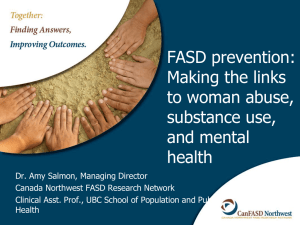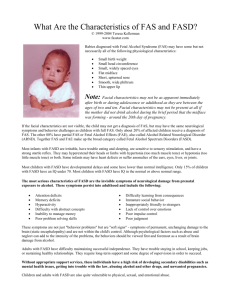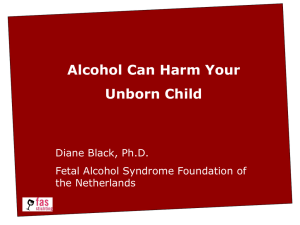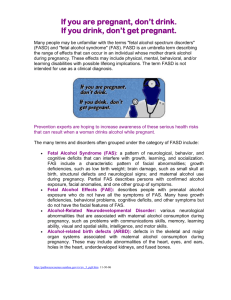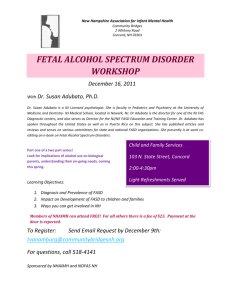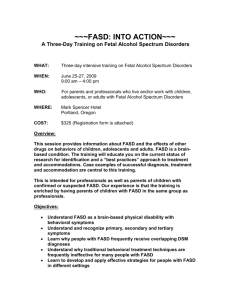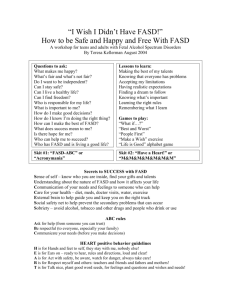Raising a Child with FASD in Northern Ontario
advertisement
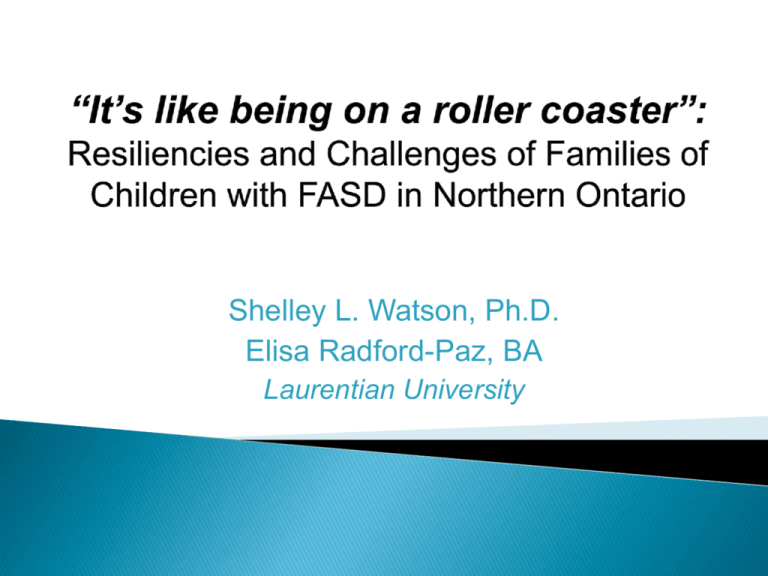
Shelley L. Watson, Ph.D. Elisa Radford-Paz, BA Laurentian University What is Fetal Alcohol Spectrum Disorder (FASD)? Brief History of Family Research and Theory Raising a Child with FASD in Northern Ontario ◦ Methodology and Rationale ◦ Preliminary Findings Implications and Future Directions Based on a 4-digit Diagnostic Code developed by Astley and Clarren Individuals are screened and then assessed in 4 areas: ◦ Growth deficiency ◦ FAS facial phenotype ◦ CNS damage or dysfunction ◦ Gestational exposure to alcohol Ranking scores in each area range from 1 to 4 Possible Diagnoses: FAS, Partial FAS, FAE, ARND, ARBD (Chudley et al., 2005) First-generation research on the impact of child disability on families (mothers) presented a bleak picture of stress, burden, depression, social isolation, and psychological dysfunction ◦ e.g., Solnit and Stark (1961) As research became more refined, apparent that disability per se is not necessarily a predictor of dysfunction ◦ Hosts of variables appear to influence the relationship between disability and adaptation or maladjustment Family Adjustment and Adaptation Response (FAAR) Model (Patterson & Garwick, 1998; shown with permission) Most research on family adaptation to disability has focused on children with mixed disability or type of disability is not mentioned ◦ Certain conditions predispose individuals to specific adaptive and maladaptive behaviours, strengths and weakness, as well as health vulnerabilities ◦ Therefore, an exploration of family responses to receiving different diagnoses is relevant Little is known about families of children with FASD ◦ No studies on families in Northern Ontario found Mixed Methods design ◦ Qualitative Interviews Basic Interpretive Qualitative Inquiry (Merriam, 2000) ◦ Questionnaires Hope Scale (Snyder et al., 1991) Family Resource Scale (Dunst & Leet, 1986) Parenting Stress Index – Short Form (Abidin, 1995) Questionnaire on Resources and Stress – Short Form (Friedrich, Greenberg & Crnic, 1983 ) Family Crisis Oriented Personal Scales Olson, & Larsen, 1991) (McCubbin, Basic Interpretive Qualitative Inquiry ◦ Seeks to describe, interpret, and understand another’s perspective (Merriam, 2002) Focus on meaning Parents’ ability to ascribe meaning to their child’s disability and their own parenting experiences significantly influences experience ◦ Families fare better when they are able to make meaning of the disability (Pakenham, Sofronoff, & Samios, 2004) Families in Northern Ontario ◦ Greater Sudbury, North Bay, Sault Ste. Marie, Thunder Bay so far ◦ 33 parents/guardians from 25 families 3 birth mothers 1 birth mother to two children with FASD 1 birth father 16 adoptive and/or foster mothers 8 adoptive and/or foster fathers 2 custodial grandmothers also believe their daughters have FASD 1 custodial great grandmother 1 custodial great grandfather 1 custodial sister Parenting Stress Index • Overall level of parenting stress • Parents who obtain a Total Stress score at or above the 90th percentile are experiencing clinically significant levels of stress. • Nineteen parents scored above the 90th percentile for Total Stress. The only parents to score lower than the 90th percentile were Audrey and Tamara. Basic behavioural characteristics of children that make them either easy or difficult to manage. e.g., “My child’s sleeping or eating schedule was much harder to establish than I expected” “It’s just frustrating” ◦ Search for a diagnosis “FASD, ADHD, ODD, QRST…” ◦ A focus on labels “100% of the time, you just have to be aware” ◦ Challenges faced by family members “She has been a tremendous support” ◦ What has helped “Safe, appropriate respite” ◦ What would help Northern Ontario issues Technology Specialists in Toronto Lack of confirmed maternal drinking “and it’s highly suspected because of pediatricians and doctors that we’ve seen. It can’t be diagnosed for sure unless the birth mother would admit to it… but doctors and psychologists and psychiatrists and everybody has said that it’s highly suspected to be FASD… they won’t diagnose her in Toronto until they get proof of maternal drinking… It’s just frustrating because the [doctors], they said, there’s not much more we can do from here…” (Marianne, adoptive mother) Multiple Labels ◦ ADHD; ODD ◦ Reluctance to give a diagnosis of FASD Sleep issues ◦ “She has a hard time falling asleep… she would be up wandering around at 2 or 3 in the morning and she was a danger to herself… She would get into some things at nighttime, so we had to put a system on her door, so we knew that she was up” (Donna, adoptive mother) Childhood issues ◦ “24/7 you have to be aware. You never really can settle... You can never take anything for granted” (Sarah, adoptive grandmother; birth mother) Adolescence issues ◦ “I guess more or less in their teens, that life on a rollercoaster began with them” (Kaylee, adoptive mother to 2 children with FASD) Someone to listen ◦ FASD coordinator or support group ◦ “I’m on FAS Link... It’s been a wonderful support. I learn stuff there every day. I belong with them. That is so important. That is why I started the parent support group” (Gabrielle, adoptive mother and FASD educator) Reluctant to leave child ◦ Need someone they can trust who understands the unique needs of children with FASD Continue interviews ◦ Birth Mothers Rethink diagnostic process ◦ Focus on labels ◦ Confirmation of maternal drinking ◦ Access to quicker diagnosis Consortium National de Formation en Santé (CNFS) Health Canada Laurentian University Research Fund • Extent to which respondent approaches the questionnaire with a strong bias to present the most favourable impression to minimize problems or stress in the parent-child relationship. • Scores below the 10th percentile are considered significant. • Most parents scored higher than the 10th percentile, suggesting that they did not use defensive responding. • One parent scored below the 10th percentile. e.g., “I often have the feeling that I cannot handle things well” FAS vs. FAE “The diagnostic process for FAE is a nightmare. I’ve actually given up on getting a formal diagnosis” (Karen, foster mother)
